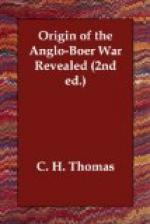It may well be imagined that Mr. Chamberlain and his noble colleagues had anything but beds of roses whilst pursuing the diplomacy adopted to checkmate the Bond. They had to gain national support without divulging their own proceeding, and were at the same time reduced to a situation which imposed a spartan fortitude in concealing and repressing involuntary perturbation in the presence of an impending national crisis, and also the stoical endurance of bitter recriminations on the part of an opposition comprising a large and honourable but poorly informed section of the English nation.
BOER LANGUAGE
We come now to the topic of language, which will be found relevant, showing Hollander and Bond influence in using that also as a hostile weapon. What the Boers still speak is a vernacular or dialect so far removed from High Dutch as to be unintelligible to the uninitiated Hollander. It took its form from the dialects brought to the Cape of Good Hope by unlettered Dutch colonists and a large admixture of locally produced idioms, with a slight trace of the structure of the French language in expressing negations. In the two Republics High Dutch rules for official purposes, but in common intercourse the vernacular Dutch is still about the same as it had been a hundred years ago. For an English-Dutch interpreter the thorough knowledge of the vernacular is essential. Preachers and teachers have to adapt their speech by combining High Dutch with the dialect, the one or the other predominating according to the capacity of the hearers. Hollanders follow the same method when learning the vernacular Dutch.
In towns and villages, not only in the Colonies, but also in both Republics, English is almost exclusively used. The Boers, and especially the younger generation, have a much greater aptitude and penchant for learning English than for High Dutch; and generally it has been held more important by the parents that their children should become proficient in English, that language being more easily acquired and of vastly greater use than Dutch. The latter, it was truly averred, would be learnt as they grew up quite sufficiently for all purposes.
The feeling thus existed some twenty years ago that English would become general, and ultimately oust both Dutch and the vernacular. Numerous Boer patriots then devised the remedy of preserving the vernacular by raising it to the standard of a written and printed language for official as well as common use. The Rev. du Toit, later appointed Minister (or Superintendent) of Education in the Transvaal, worked tenaciously towards making that movement a national success. He had the co-operation of many other educated patriots likewise. The Paarl Patriot, a journal published in the vernacular, is one of the surviving efforts. Vocabularies, school books, etc., etc., were printed in that dialect, and the translation of the Bible had




